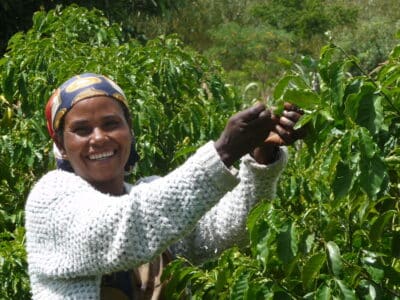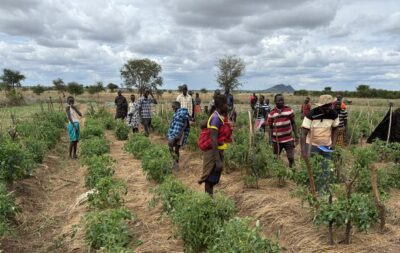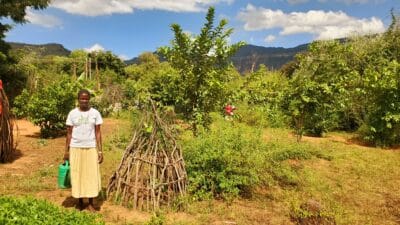News
11 October 2012
Trustees visit Ethiopia women’s project

Farm Africa’s Board of Trustees have just returned from Ethiopia where they had the chance to witness at first hand how a Farm Africa project is literally changing the lives of women in a remote rural area of the country.
Farm Africa trustee Victoria Rae gives a personal perspective on the visit.
Chachole kebele in the West Haraghe area of Ethiopia is a six hour bus journey from Addis Ababa. The trip took us through stunningly beautiful scenery – mountains and flat plains, a bumpy causeway and across a lake. We travelled the last few miles, in a 4WD, along a track through farmland planted with maize and sorghum.
I felt excited and unsure what to expect. This visit was the chance to see with my own eyes how Farm Africa is helping change lives – moving women and their families from dependency and doubt to giving them security and hope. A step up, not a hand out.
A crowd of hundreds of women, men, children and goats greeted us, curious about the visitors and above all proud to be able to show off their successes.
The Rural Women’s Empowerment Project in this kebele and others in the district, works to target the poorest of the poor. In an area where there might now be a drought every two to three years rather than every 10 years as before, life is precarious. This work aims to lift families out from the Government safety net programme so they can provide for themselves and plan ahead for the future rather than living uncertainly from day to day.
What I saw was simple and effective. A Women’s Asset Group, funded by Farm Africa, gives two female goats to a first group of women so they have milk for their families. A locally trained community animal health worker looks after the buck. A few months later, the woman gives the first female kid to a woman in a second group.The groups stand with glowing pride by signs showing the numbers of assets that have been distributed and explain how the goat assets allow them to trade for other livestock and food or send a child to school.
Access to savings and loans
The second aspect of the project is the Village Savings and Loans Association – again a simple scheme, where small groups of the community pay into what they call the Bank of the Village. For some it is 1 or 2 birr a week (just a few pence). With training in managing money and record-keeping plus the solidarity of the village, the savings scheme allows members to take loans to buy livestock. It also has a social fund to help families in time of emergency, such as transport to hospital. The repayment rate of loans is 100% – nearby three young cows now owned by the group in the Sodoma kebele, stood by as proof of what can be achieved.
Changing lives
Our final visit was to Legelafto kebele. Here we were treated to a dramatisation of how Farm Africa has trained community based legal advisers – young women who have the respect of the community and advise on matters including domestic disputes, inheritance rights and ending traditional harmful practices. It was a lively performance. Here too, more than one person spoke powerfully of the changes in their lives. They said, the day that Farm came to their community, was like the day they were born again.
As Trustees we came to learn and the lesson for me is that this is working and transforming lives. Seeing is believing. As the crowd plus a few goats clambered down the bank to wave us off, I knew that thanks to Farm Africa’s start up investment, we can be proud of our part in building a community that is resourceful, proud and with renewed confidence in their own future.
Read more about Farm Africa’s Rural Women’s Empowerment Project.




